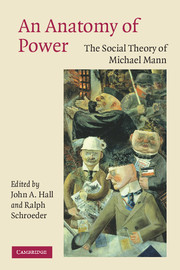Book contents
- Frontmatter
- Contents
- List of figures
- List of contributors
- 1 Introduction: the IEMP model and its critics
- Part I Theory, practice, method
- Part II Types of power
- 6 Mann's theory of ideological power: sources, applications and elaborations
- 7 Political power un-manned: a defence of the Holy Trinity from Mann's military attack
- 8 Mann, the state and war
- 9 Infrastructural power, economic transformation, and globalization
- Part III European exceptionalism?
- Part IV Promise and perils of modernity
- Part V Response
- Bibliography of Michael Mann's Writings
- Index
- References
8 - Mann, the state and war
Published online by Cambridge University Press: 22 September 2009
- Frontmatter
- Contents
- List of figures
- List of contributors
- 1 Introduction: the IEMP model and its critics
- Part I Theory, practice, method
- Part II Types of power
- 6 Mann's theory of ideological power: sources, applications and elaborations
- 7 Political power un-manned: a defence of the Holy Trinity from Mann's military attack
- 8 Mann, the state and war
- 9 Infrastructural power, economic transformation, and globalization
- Part III European exceptionalism?
- Part IV Promise and perils of modernity
- Part V Response
- Bibliography of Michael Mann's Writings
- Index
- References
Summary
Michael Mann's two-volume magnum opus, The Sources of Social Power, is, in my opinion, one of the most impressive works of scholarship produced in the last fifty years. Indeed, the striking mix of empirical sensitivity and sweeping historical narrative within a sophisticated theoretical framework is such that the informal label of Mann as the ‘modern-day Max Weber’ is – despite his effacious modesty – richly deserved. That said, I do see some significant problems in his work, though I will argue here that these can be remedied. In this chapter I reconsider and evaluate Michael Mann's broad corpus of work through the lens of International Relations theory. This makes sense because Mann's work has direct relevance for International Relations (IR), and to the extent that he invokes the importance of the ‘international’ when explaining social change, so he inevitably and unavoidably enters the terrain of IR theory. My central objective here is to use insight from IR theory to enter into a constructive dialogue with Mann, ultimately so as to suggest ways in which his pioneering theory can be further enhanced.
It is important to begin by noting that, unbeknown to most historical sociologists, in the last decade or so a growing number of IR scholars have begun to look towards the neo-Weberian historical sociological works of Mann and others. The reason for this is straightforward. The hitherto dominant paradigm of IR – neorealism – has increasingly been found wanting for at least four major reasons.
- Type
- Chapter
- Information
- An Anatomy of PowerThe Social Theory of Michael Mann, pp. 150 - 166Publisher: Cambridge University PressPrint publication year: 2006
References
- 4
- Cited by

